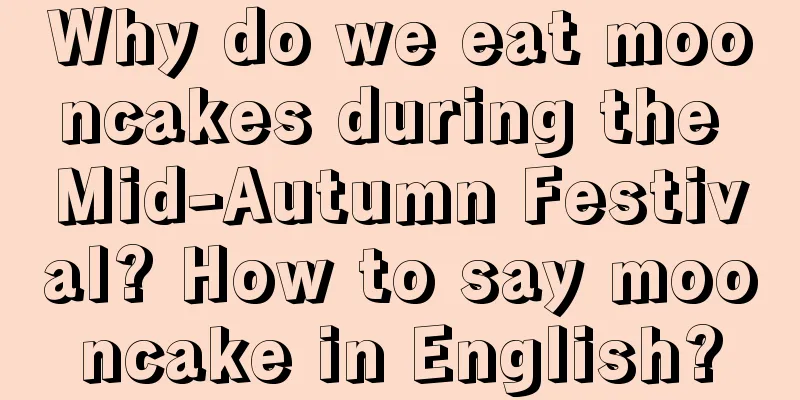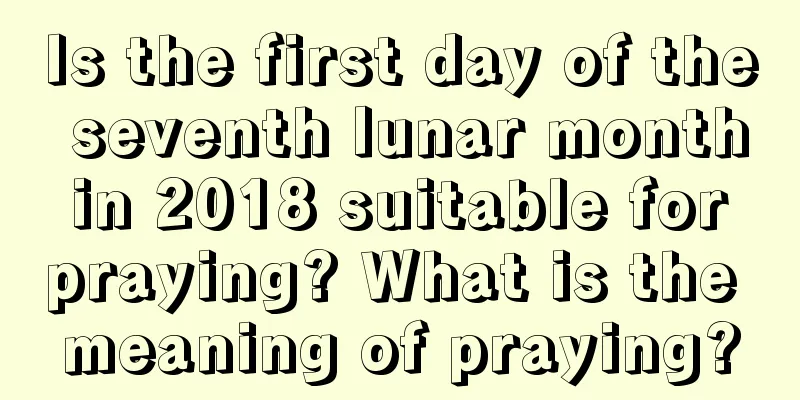What festival is on the eighth day of the fourth lunar month? Bull King Festival? Cow Break?

Introduction: The festivals of ethnic minorities are rich in their respective national characteristics and are the distinctive representation and inheritance of national culture. The festival culture of ethnic minorities is a shining pearl of my country's festival culture. So, what festival is the eighth day of the fourth lunar month for ethnic minorities? Let’s take a look at it together below! April is also known as Mengxia, Yinyue and Meiyue, so the fourth month in the lunar calendar should belong to the early summer season, allowing you to experience every day of April wonderfully and spend it with beautiful happiness.April 8th: The Ox King Festival of the Dong NationalityThe Dong people in Jiuzhaigou regard April 8 as the Ox King Festival. The Ox King Festival, called "To Sheng Ni" in the Dong language, means "the birthday of the cow", and is also called "Ox King Meeting", which means "dinner for the cow's birthday" in the Dong language.On this day, women in every household cook white rice and stir-fry oil tea for the cows at home. Those who are better off will also boil eggs for the cows to eat, to show people's deep condolences and warm rewards to the cows before the busy spring ploughing. After the lunch party, people go home, roll up their sleeves, put their hands in a wooden basin, and test whether the rice and oil tea in the basin are hot. Then they take the wooden basin, eggs and roasted wine to the cowshed and let the cows enjoy their fill. At this time, the owner would often hold the ox's head and caress it affectionately, saying: "Ox, you are my family's wealth, you are my family's treasure. You have worked hard all year round. Just eat and drink well. I hope you will have no disasters, no monsters or plagues. Work hard with me, and in return I will have a good harvest and prosperity. Next year, I will treat you well again." At this time, the ox seemed to understand human nature. It would stretch out its tongue to lick people and smile at people with squinting eyes. When the cow is full, the kid next to it will pull it out to eat tender grass, wash its body and comb its hair. Grooming and washing are done very seriously. If a person's cows are not clean and their hair is not shiny, people will look down on him and say that he is lazy. After the cows go out, the owner will clean the cowshed and then put dry and fluffy straw or thatch in it so that the cows can spend their holiday comfortably. During the Ox King Festival, cattle are not allowed to fight, slaughter cattle for meat, or work. In short, on the day of the Ox King Festival, even if the thunder god descends to the earth, it cannot move a single hair of it. On this day, the householders will accompany their cows to celebrate their birthdays. After the cows are pulled back to the pen, they will walk around the pen, repairing and mending the cows, fearing that they will be inconsiderate and let down their beloved oxen. Some will take the cows out to hike in the mountains to eat fresh grass and enjoy the natural beauty of mountains and rivers. On this day, people also observe the weather and predict the harvest. I hope it is a sunny day, firstly so that I can prepare for the ox, enjoy the festival and recharge my batteries for the coming pear harrowing; secondly, it indicates that there will be a good harvest this year. In fact, on the day of the Beginning of Summer, one can have a rough idea of the harvest. As the folk saying goes, "It must rain at the Beginning of Summer. If it doesn't, the pear trees will be hung high." Indeed, it is said that this day is of great significance to farmers and to the human world. If the sun is shining brightly on this day, people will be extremely excited and even believe that this is the manifestation of the divine power of the Ox King, bringing good luck to the world. Then all the men, women and children in the village will be intoxicated in the carnival atmosphere. April 8th: She ethnic group festival "Cow Resting Festival"The She people call themselves "Sanha". "Ha" is the She language, meaning "guest", referring to the guests living in the mountains. In ancient times, Shejia originally referred to slash-and-burn farming. The use of "She" as the name of the ethnic group began in the late Southern Song Dynasty, and it has been more than 700 years since then. Ruiyun is one of the She ethnic group settlements in Xiamen She Ethnic Township. The She people here pioneered and reclaimed the land, worked bravely, and expressed their feelings through songs. They created a unique national culture in the long history and still maintain their unique national costumes, marriage customs, folk songs and other folk customs. The eighth day of the fourth lunar month is the King of Songs Festival, also known as the "Ox Rest Festival." It is said that during the Spring and Autumn Period, there were two singing kings in the State of Chu, one named Zhong Ziqi and the other named Zhong Yi. The tunes "Da He" and "Xiao He" played by the Chu State musician Bole were about mountains and flowing water, and only Zhong Ziqi could sing along with them. After Zhong Ziqi died, Bole threw his zither away and never played it again. Zhong Yi was originally the Duke of Yun of Chu. He was recommended by the State of Zheng to the State of Jin, and the King of Jin asked him to play the piano and sing. Zhong Yi inherited the singing and playing skills from Bole and Zhong Ziqi, and "played the zither, southern music, and local music with them." The King of Jin was very happy to hear this, and he promoted him to an important position, appointing him as the Minister of Rites. Later, in order to commemorate the two singing kings of the She ethnic group, the She people would set up an altar and hold singing parties on the eighth day of April every year, singing "Da He" and "Xiao He". They also designated this day as the She ethnic group's traditional festival, the "April 8" King of Songs Festival. At the same time, this day is also a festival for the She ethnic group's working oxen. To reward the oxen for their hard work throughout the year, "whipping is strictly prohibited to calm the ox's soul", and they are provided with good fodder and the best home-brewed wine for the oxen to eat and drink. The shepherd boys sing "cow songs" loudly over and over again: the ox's horns are born flat, and it carries a thousand-pound plow on its body. The buffalo cooks for people, and it rests for a while on the eighth day of April, so it is also called "Cow Rest Festival".Summary: The above article is a detailed analysis of the question of what festival the eighth day of the fourth lunar month is for ethnic minorities. You can refer to it. I hope you like this article! |
>>: On April 8th, the prince urinated? What are the traditional customs on April 8th?
Recommend
Analysis of the lunar calendar and auspicious and inauspicious times for the Chinese Valentine's Day in 2022
"Qixi Festival" is a traditional Chinese...
Is it a good idea to get the marriage certificate on September 30, the day before National Day in 2019? What is the other name of National Day?
Introduction: You need to choose an auspicious day...
What is the fate of a boy born on the eighth day of the eighth lunar month in 2020? OK?
The destinies of different children are different....
Is it a good idea to move house on October 21st of the lunar calendar in 2017? Can I move into a new home?
Many people like to arrange happy events in winte...
What is the exact time of the Great Cold solar term in 2019? What time is it?
Dahan is the last solar term among the 24 solar te...
What are the auspicious days for funerals and burials in April of the lunar calendar in 2019?
Introduction: Funeral is an extremely serious matt...
Can I get a haircut or shave on June 13th of the lunar calendar in 2021? Is it an auspicious day?
The sixth month in the lunar calendar is a short m...
What are the Feng Shui considerations for keeping Feng Shui fish at home? What is the best way to place the fish tank?
Introduction: Nowadays, more and more people in so...
What are the customs of the Spring Festival in Southern Fujian?
The Golden Triangle region in southern Fujian atta...
Is it a good idea to get engaged during Christmas 2018? What do you need to prepare for an engagement?
Christmas was originally an imported holiday, but ...
What should we pay attention to during the Beginning of Autumn? Which solar term is the Beginning of Autumn among the 24 solar terms?
The Beginning of Autumn not only indicates that th...
Is the fortune good or bad for people born on Double Ninth Festival in different years whose zodiac sign is snake?
Is the fortune good or bad for people born on Doub...
Is June 20th of the lunar calendar in 2022 a good day? Is this a good day to get a haircut?
The sixth month of the lunar calendar is the last ...
What date is April 16th of the lunar calendar in 2019? Can we start renovations?
In ancient times, decoration was also called repai...
Overall fortune and personality analysis for girls born on June 7, 2020!
Introduction: Children born on different days have...









